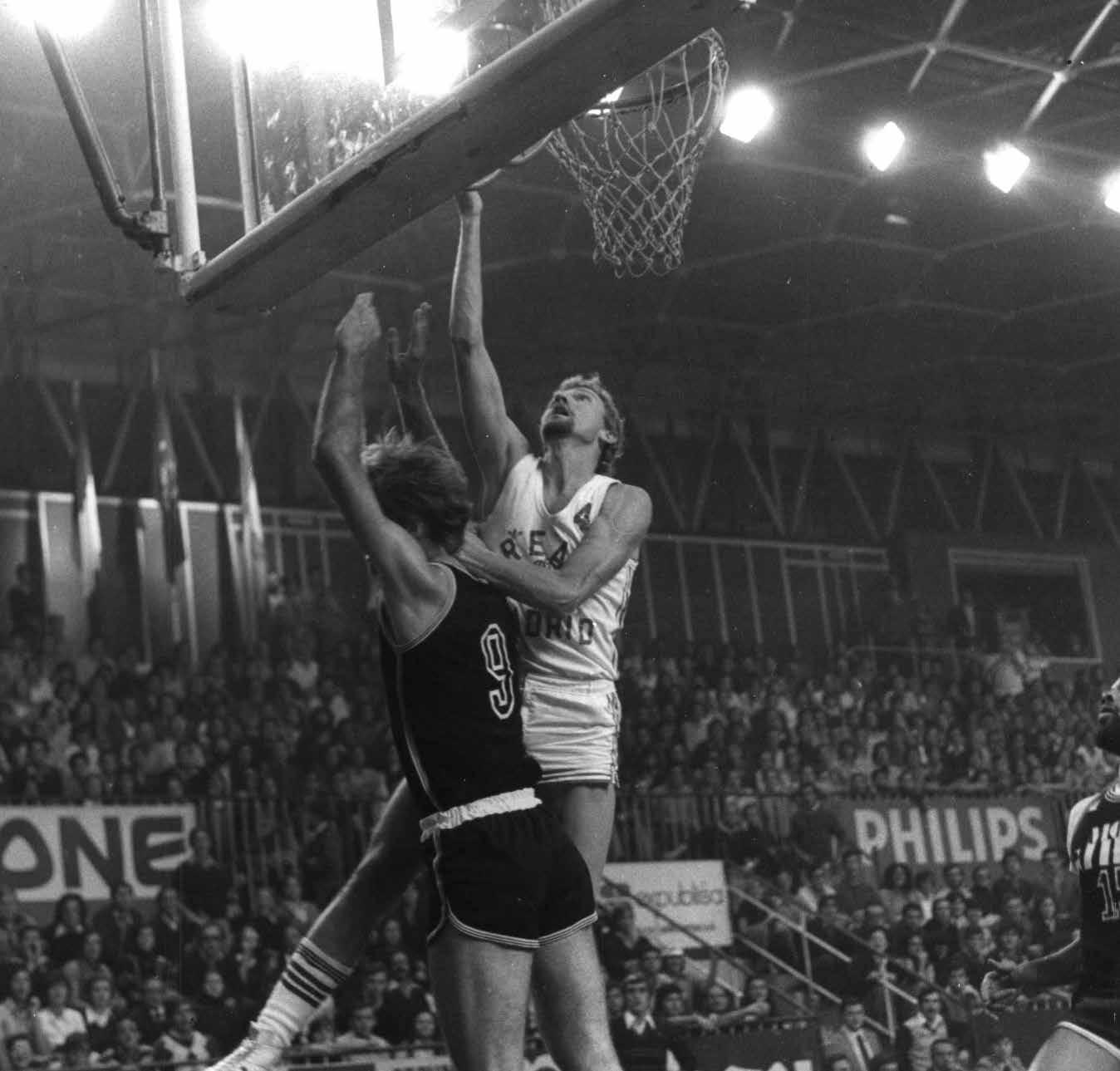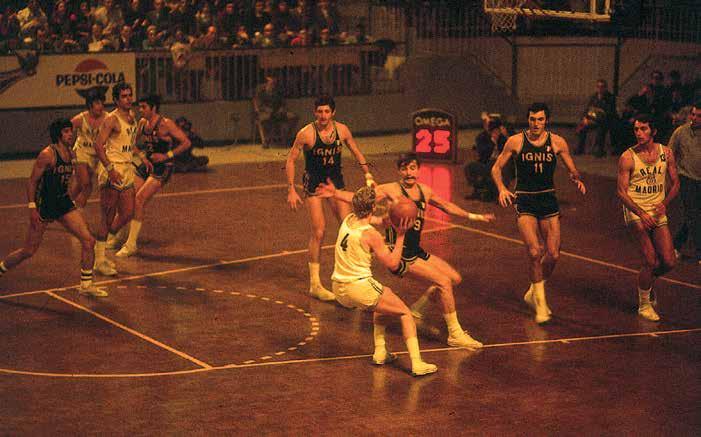
6 minute read
WAYNE BRABENDER
Wayne
Brabender
Advertisement
An atypical star T he personal ID card of Wayne Brabender says that he was born on October 16, 1945, in Montevideo. The first associa tion would be Uruguay, but he is not from that country’s capital. In the state of Minnesota, in the United States, there is another Montevideo which probably would have nev er entered sports history without Brabender. When he was just 7 years old, his first coach, Ter ry Donay, taught Brabender his first steps in a sport called basketball. That decided the future of the blond and thin kid who, judging by his physical attributes, probably shouldn’t have had a bright career in a sport normally reserved for bigger and stronger men. How ever, since the very dawn of his career, Brabender was just a different kind of player. With good technique, solid jumping ability, great defense and, most of all, an excellent shot, he would become the best player on his high school team.
At 22 years old Brabender was already a physical education teacher, but his immediate future would be involved with basketball, no doubt. In the 1967 NBA Draft, the Philadelphia 76ers picked him at number 145. Destiny, however, would have different plans for the young Brabender.
Pedro Ferrandiz, the visionary The legendary coach of Real Madrid, Pedro Ferrandiz, was a pioneer in many things, and especially in bringing good American players to Europe. Ferrandiz just didn’t trust anyone. If he heard rumors about a
player being good, he had to go see for himself. Then, he would make sure to check out a few more players in order to make the trip worthwhile. No middlemen, no agents, no videos, which didn’t exist: Don Pedro just packed up his suitcase and toured the USA. More often than not, he came back to Madrid with a future star.
When he saw Brabender he had no doubts about him. That was the player he needed to fill the spot of the second foreigner in the EuroLeague. According to legend, when Ferrandiz knocked on the door of Bra bender’s house, Wayne himself opened the door and Ferrandiz asked him if he had an older brother because the young man seemed even smaller off the court than on it. After working out the misunderstanding, one of the better and most profitable contracts in Real Ma drid’s history was put to paper.
On August 26, 1967, young Wayne Brabender landed in Madrid and started his Spanish adventure, which has now lasted 50 years and counting. Everyone in Madrid, from the club itself to the media, was surprised by the looks of the new American, because normally Ferrandiz brought back big men. Also, Real Madrid already had Miles Aiken for the Spanish League, so it was planned that Brabender would only play in the EuroLeague, on which the team placed such high aspirations. It wasn’t easy at all for Brabender to play only in EuroLeague games or practice all alone on the weekends, while the team was elsewhere playing in the domestic champion ship. But Brabender dealt with it all and the club also showed patience with him.
In the traditional Real Madrid Christmas tournament of 1967, the American rookie exploded with 30 points while showing great qualities on offense. His outside shot was perfect, and he was a great complement to the inside game of Aiken and Clifford Luyk. Right off the
101 greats of european basketball101 greats of european basketball Wayne Brabender
bat, Ferrandiz, backed by manager Raimundo Saporta, realized that Brabender could be an enormous addition to the team. So they proposed to him the possibility of getting a Spanish passport. Brabender accepted the of fer, and soon Spain gained a great player. The fact that Brabender still lives in Spain today proves that this was a case of true nationalization.
On May 10, 1969, Wayne Brabender made his debut with the Spanish national team in Badalona against Cu ba, playing 90 seconds. A little later, playing against Belgium in a EuroBasket qualifying tournament in Mataró, Spain, he suffered a knee injury and had to be sidelined for 10 months. But he persevered and returned to Real Madrid and the national team. At the 1973 EuroBasket in Barcelona, Brabender helped Spain win a silver med al, the country’s first in men’s basketball since another a silver at the original EuroBasket, back in 1935 in Gene va. In that 1973 title game, Spain fell to Yugoslavia, who won its first continental title, 67-78. But Brabender’s 20 points – a little over his 19.3 average in the tourney – confirmed that Spain had a great new star.
I saw Wayne Brabender countless times on TV, but I think the first time I saw him live was at the 1975 Eu roBasket in Belgrade. I saw him also two years later in Belgium and again at the 1980 Olympics in Moscow, where Spain finished fourth. I still remember his incred ible game of 30 points against Yugoslavia, the future Olympic champ, who struggled but won 95-91. Chicho Sibilio added 23 points for Spain while on the other side there was the great duo of Dragan Kicanovic (25 points) and Drazen Dalipagic (24). Non-stop titles Brabender played 190 games with the Spanish national team, but it was Real Madrid who took more
advantage of his qualities. During his 16 years with Los Blancos – which looks like an eternity today, when play ers change clubs so often – he won 13 Spanish Leagues (10 of them in a row, from 1968 to 1977), seven Span ish Cups, three Intercontinental Cups (1976, 1977 and 1978, each time scoring more than 20 points in the final), and four EuroLeagues. Real Madrid was, without a doubt, the strongest team in Spain back then, and it didn’t need much to win national titles. But to compete with Ignis Varese, CSKA Moscow or Maccabi Tel Aviv, the latter of which was starting to show great ambitions in the early 1970s, Real Madrid needed a great player like Brabender.
Real Madrid’s first European title with him on the team came in 1968 in Lyon, France against Spartak Br no of Czechoslovakia, with a 98-95 final-game victory thanks to 26 points from Aiken and 22 from Brabend er. The next European crown would arrive on April 11, 1974, in Nantes against Varese in a very balanced game that finished 84-82. Brabender once again scored 22 points, Walter Szczerbiak and Luyk had 14 each, while on the other side, the “magnificent trio” of Dino Me neghin (25), Bob Morse (24) and Manuel Raga (17) kept hopes alive for their team until the final moment.
Four years later, in 1978, the same rivals met again in the Munich final. Real Madrid won 75-67 with 26 points by Szczerbiak and 16 by Brabender. His last European title was on May 27, 1980, in Berlin as Madrid defeated Maccabi 89-85 behind 27 points by Rafa Rullan and 12 by Brabender.
He played at Real Madrid until the end of the 1982-83 season and put an end to his brilliant career with Caja Madrid, playing two more seasons. When Brabender retired in 1985 he was 39-and-a-half years old. His Spanish League stats hardly reflect the impact

that Wayne Brabender had on Spanish basketball. The league started in 1983 at the twilight of his career. Only the press archives from the 1970s and the memories of those lucky enough to have seen him play offer ac tual testimony about this great player and person, who could set an example in just about anything.
Brabender was an atypical star, especially because of his modesty. He was a person beloved by his team mates and respected by rivals. I remember some conversations that I had with the late Mirza Delibasic about the friendship that he had with Brabender and his family, and how they helped Delibasic adapt when he signed for Real Madrid.
After his great career as a player, Brabender stayed in basketball as a coach. He worked at Real Madrid, CB Canarias, Forum Valladolid and CB Illescas. His son, Da vid, was born in Madrid in 1970 and also played in the Spanish League for 12 years. The Brabenders, especial ly Wayne, have left their imprint on Spanish basketball.










